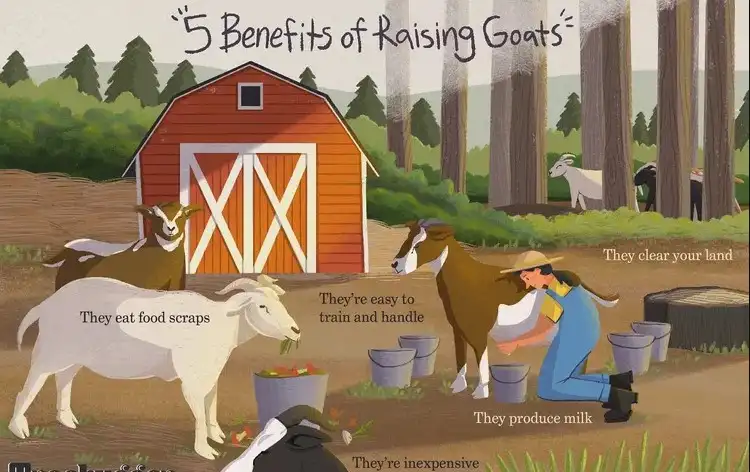What are goats good for? This article answers the question by detailing the many practical advantages goats offer to small farmers, homesteaders, and anyone interested in sustainable agriculture. From producing milk and fiber to clearing brush, providing meat, and even acting as pack animals, goats are a remarkably versatile addition to any property.
Why Choose Goats? Multipurpose Value for Any Farm
Goats offer a unique blend of benefits that make them an excellent choice for a wide range of farming and homesteading needs. Unlike more specialized livestock, goats can serve several important roles at once. Here’s what they bring to the table—literally and figuratively.
Essential Uses for Goats
From the kitchen to the pasture, goats can do much more than many people realize. Their uses span far beyond traditional milk and meat production.
- Meat for Your Table or for Sale. Raising goats for meat is both a practical way to feed your household and a potential small business. Goat meat is enjoyed worldwide, and local demand is rising.
- Abundant, Nutritious Milk. Dairy goats can supply more milk than most families need, making goat cheese, yogurt, and kefir easy to produce at home. Goat milk is often tolerated by people who can’t drink cow’s milk, opening up new markets and health options.
- Luxurious Soap. Goat milk creates a gentle, moisturizing soap popular with those who have sensitive skin or allergies to commercial alternatives.
- Valuable Fiber. Certain goat breeds, such as Angora, Pygora, and cashmere goats, produce high-quality fibers like mohair and cashmere. These can be spun, woven, or knitted into premium yarn and textiles.
- Natural Land Clearing. Goats are excellent browsers. They thrive on weeds, brambles, and brush that other livestock ignore, helping to clear land in an eco-friendly way.
- Pack Animals and Cart Pullers. With the right training, goats can carry 20–30% of their body weight on hikes or even pull small carts, making them useful companions for off-grid or rugged terrain.
- Dung as Fuel. In many parts of the world, goat dung is dried and used as fuel for fires—an option for those seeking maximum self-sufficiency.
- Leather and Hides. Goat skins can be tanned for gloves, rugs, and even musical instruments, while hides with hair are traditionally used for drum heads and rugs in some cultures.
- Easy to Train, Easy to Handle. Goats are sociable, curious, and smart—making them a good fit for children or those new to livestock. Their manageable size is a bonus for daily care and handling.
- Low Maintenance, Low Cost. Goats are thrifty animals. Their browsing ability reduces feed costs, and their shelter requirements are minimal compared to larger livestock—though strong fencing is a must.
- Excellent Fertilizer. Goat manure is rich in nutrients like potassium and nitrogen, and its pellet form is easy to collect and spread. A single goat produces around 300 pounds of manure each year, boosting soil health naturally.
Why Goats Stand Out: Versatility and Efficiency
Goats are more than just a source of milk or meat. Their adaptability makes them suitable for almost any farm setup, from rural acreages to suburban backyards. Whether you’re looking to start a small business, create your own dairy products, or simply clear invasive plants from your land, goats are up to the task. Their combination of utility, manageability, and low cost is hard to beat.
“In the world of small-scale farming, few animals pack as much value into such a small, curious, and hardy package as the humble goat.”
If you’re thinking about adding livestock to your homestead, goats deserve a serious look. With the right care and planning, they’ll pay you back many times over—in milk, meat, fiber, and a greener, healthier property.





